AMERICAN INSTITUTE FOR ECONOMIC
RESEARCH |
Low taxation of land in relation to taxation of
improvements fosters underutilization of land and a reluctance to
construct and maintain improvements. That the supply of land is
limited ensures that as population and economic activity increase,
demand for land and thus prices will increase. Such low relative
taxes on site values enable owners to leave sites idle or in
uneconomic use. The smaller the land tax, the less incentive
owners have to use land productively or ot sell it to someone who
will. Yet, as general population increases and economic gowth
result in higher prices for land, the private owner reaps the
return on publicly created value.
Thus, a de facto subsidy is provided by payers of the larger tax
on improvements to land.
[Economic Education Bulletin,
February 1987, p.3]
|
Allen,
Charles Grant
(1848-1899)

ENLARGE
|
Not one solitary square inch of English soil remains unclaimed
on which the landless citizen can legally lay his hand without
paying a toll to somebody; in other words, without giving a part
of his own labor or the product of his labor to one of the
squatting and tabooing class in exchange for their permission
(which they can withhold if they choose) merely to go on existing
upon the ground which was originally common to all alike, and has
been unjustly seized upon (through what particular process matters
little) by the ancestors or predecessors of the present
monopolists.
[From: "Individualism and
Socialism," Contemporary Review (1889), p. 732]
|
Allen,
Charles Grant
|
By this time the grave political differences which separated
[Herbert Spencer] from many of his early friends had either
deepened or lessened. He found himself more in accord with those
whom he had quitted, and less in accord with those whom he had
regarded as the faithful few of his followers. The rock on which
he split with his younger disciples was Socialism. Very early,
most of those whom he had profoundly influenced had been led by
the perusal of “Social Statics” into the acceptance of
his original idea of Land Nationalization. Alfred Russel Wallace,
the chief English exponent of the doctrine, founded his argument
entirely on Spencer. Later on Wallace became a convinced
Socialist, as did most of the other thinkers whose opinions
Spencer had most deeply leavened. Two of those whom he specially
regarded as his chosen disciples were Miss Beatrice Potter,
afterwards Mrs Sidney Webb, and myself. I do not think I am going
too far in saying that he looked upon us as his two favorite
followers. But it was a great blow to him when we both, as he
expressed it, “turned socialist.” He himself had been
growing steadily more anti-socialist, and indeed conservative, for
years; and his later publications, such as “The Man versus
the State,” had been violently anti-radical. The following
letter shows well his frame of mind on this moot point between us,
and forms the only one in my collection in which Spencer touches
at all seriously on the crying political differences which now
divided us:
[From: Personal Reminiscences of
Herbert Spencer (1894) ]</45>
|
Allen,
Charles Grant
|
He cannot sleep without paying rent for the ground he sleeps
on. ...The very air, the water and the sunlight are only his in
the public highway. ...His one right recognized by thelaw is the
right to walk along that highway till he reels with fatigue -- for
he must keep moving.
[From: Individualism and
Socialism, Contemporary Review (May 1889), pp. 732-3]
|
Amos,
Sheldon
(1835-1886) |
Sheldon Amos was educated in the law at Clare College,
Cambridge. In 1869 he was appointed to the chair of jurisprudence
in University College, London, and in 1872 became reader under the
council of legal education and examiner in constitutional law and
history to the University of London. Failing health led to his
resignation of those offices, and he took a voyage to the South
Seas. He settled in Egypt, where he was appointed judge of the
court of appeal. He returned to England in the autumn of 1885, and
on his return to Egypt he died suddenly on 3 January, 1886. His
principal publications are: Systematic View of the Science of
Jurisprudence (1872); Lectures on International Law (1873);
Science of Law (1874); Science of Politics (1883); and, History
and Principles of the Civil Law of Rome as Aid to the Study of
Scientific and Comparative Jurisprudence (1883).
The relation of a state to its territory, which in modern times
enters into the essential conception of the state, implies that
the land cannot be looked upon, even provisionally, as a true
subject of permanent individual appropriation.
[From: Science of Law (1874),
Chap. VIII., p. 166]
|
Amos,
Sheldon |
If the land is looked upon as susceptible of
permanent appropriation by some persons, other persons must, by
the same theory, be regarded as possibly excluded fro it -- that
is, banished from the territory of the State..
[From: Science of Law (1874),
Chap. VIII., p. 166]
|
Aristotle

ENLARGE
|
The whole of the land was in the hands of a few, and if the
cultivators did not pay their rents, they became subject to
bondage. ...
|
Aristotle
|
Formerly in many States there was a law forbidding
anyone to sell his original allotment of land.
[From: Politics (Jowett's
Translation), VI, 4, p. 194]
|
Arnold,
Thomas (Dr.)
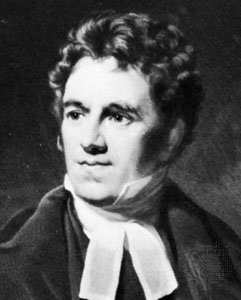
ENLARGE
|
At Rome, as elsewhere among the free commonwealths
of the ancient world, property was derived from political rights,
rather than political rights from property, and the division by
assignation of lands to the individual member of the state by the
deliberate act of the whole community, was familiarly recognized
as the manner in which property was most regularly acquired.
[From: History of Rome
(1868), Vol. I, pp. 227-8]
|
Asquith,
Herbert H.
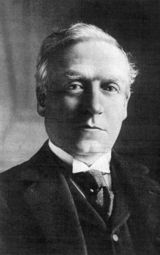
ENLARGE
|
"The value of land rises as population grows and
national necessities increase, not in proportion to the
application of capital and labour, but through the development
of the community itself. You have a form of value, therefore,
which is conveniently called 'site value,' entirely independent
of buildings and improvements and of other things which
non-owners and occupiers have done to increase its value - a
source of value created by the community, which the community is
entitled to appropriate to itself. …In almost every aspect
of our social and industrial problem you are brought back sooner
or later to that fundamental fact." [Mr.
H.H. Asquith, at Paisley, 7th June 1923]
"We hold, as we always have held, that, so far as
practicable, local and national taxes which are necessary for
public purposes should fall on the publicly-created value rather
than on that which is the product of individual enterprise and
industry. That does not involve a new or additional burden on
taxation, but it would produce these two consequences - first of
all, that we should cease to be imposing a burden upon
successful enterprise and industry; and next, that the land
would come more readily and cheaply into the best use for which
it is fitted. These two things would be two potent promoters of
industry and progress." [Mr. H.H.
Asquith, at Buxton, 1st June 1923]
|
Bagehot,
Walter

ENLARGE
|
In the early ages of society it would have been
impossible to maintain the exclusive ownership of a feew persons
in what seems at first sight an equal gift to all (the land) -- a
thing to which everyone has the same claim.
[From: Economic Studies,
Essay I, Part I, p. 31]
|
Baker,
Newton D.
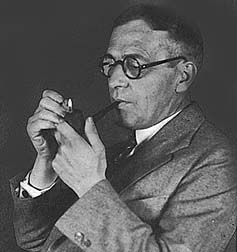
ENLARGE
|
I am inclined to believe that no writer of our
times has had a more profound influence upon the thinking of ithe
world. I have read "Progress and Poverty" several times
and have always felt that for beauty of style, elevation of
spirit, and weight of argument, it is one of the great books
written in my lifetime.
|
Barr,
Joseph M.
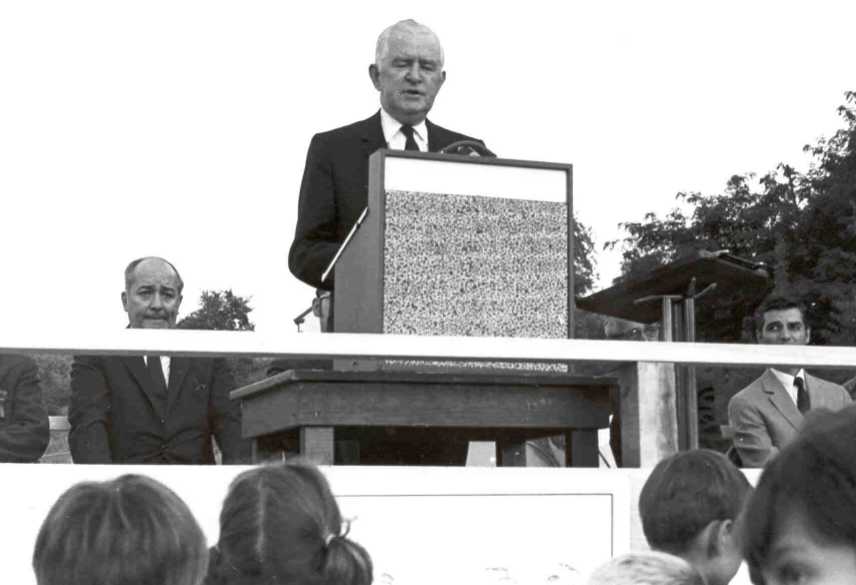
ENLARGE
|
I believe the Graded Tax plan, which was adopted
here in 1913 by an act of the state legislature, has done a great
deal to encourage the improvement of real estate in general, and
especially the building of homes and apartments. And I think it
has been particularly fair and beneficial to homeowners.
It is generally felt that most of the fine structures erected
through private enterprise and investment as part of the renewal
program, are benefited by the lower tax rate on buildings, ...
Many people now believe the Graded Tax law should be extended.
...It was first sponsored here by a Republican Mayor, William
Magee in 1913, and has since been supported by both Republican and
Democratic mayors.
The law is generally accepted in the community and there is no
significant support for its repeal or modification. In short, the
Graded Tax plan has worked well in Pittsburgh, and we believe it
would prove equally beneficial if tested in other areas.
[Mayor of Pittsburgh; from a
speech at the Henry George Convention, 1962]
|
Beard,
Charles A.
(1874-1948)

ENLARGE
|
Of all the American economists since the early
days of the republic, none treated as comprehensively the
interfiliation of economy and civilization as George did. |
Beard,
Daniel C.
(1850-1941)
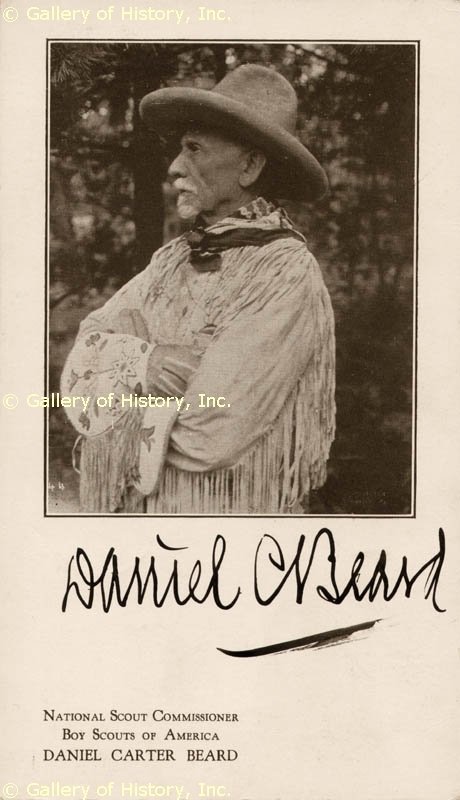
ENLARGE
|
Beard, who founded the Boy Scouts of America, had
given serious consideration to the proposals of Henry George, who
whom he wrote:
I believe in Henry George... I have long been a worker for the
Single Tax cause. ...When I read Progress and Poverty by Henry
George for the first time I could fancy I had and still have great
reverence for the truths contained in Jefferson's wonderful
Declaration of Independence, truths which, for some reason, could
not be realized or made practical because of some great obstacle,
and I never realized what that obstacle was until I read Progress
and Poverty.
|
Becker,
Gary
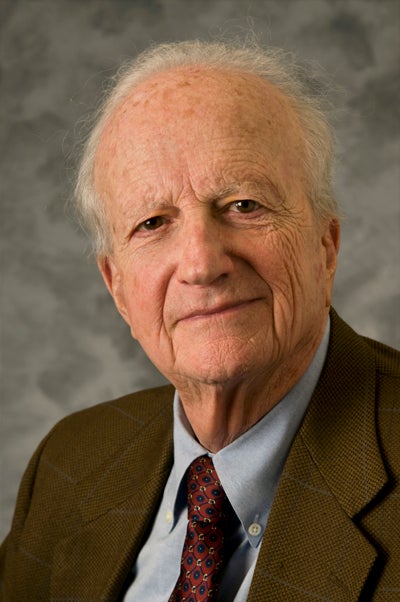
ENLARGE
|
The first book I looked at in economics was
Progress and Poverty. It's a wonderful book and had a lasting
impact on me.
[Professor of Economics, University of
Chicago, in a speech at St. John's University, April 23, 1992]
|
Bierce,
Ambrose

ENLARGE
|
LAND: A part of the earth's surface, considered as
property. The theory that land is property subject to private
ownership and control is the foundation of modern society, and is
eminently worthy of the superstructure. Carried to its logical
conclusion, it means that some have the right to prevent others
from living; for the right to own implies the right exclusively to
occupy, and in fact laws of trespass are enacted wherever property
in land is recognised. It follows that if the whole area of terra
firma is owned by A, B and C, there will be no place for D, E, F
and G to be born, or, born as trespassers, to exist.
[from: Devil's Dictionary,
1911]
|
Blackstone,
William
(1732-1780)

ENLARGE
|
The earth, therefore, and all things therein, are
the general property of all mankind from the immediate gift of the
Creator. ...There is no foundation in nature or in natural law why
a set of words upon parchment should convey the dominion of land.
[From: Commentaries on the Laws of
England]
|
Blackstone,
William
|
There is indeed some difference among the writers
on natural law, concerning the reason why occupancy should convey
this right (i.e., to the permanent property of the soil) ... a
dispute that savors too much of nice and scholastic refinement.
[From: Blackstone's Commentaries,
Book II, Chap. I, p.8]
|
Blackstone,
William |
The right of inheritance, or descent to the
children and relations of the deceased, seems to have been allowed
much earlier than the right of devising by testament. We are apt
to conceive at first view that it has nature on its side; yet we
often mistake for nature what we find established by long and
inveterate custom.
[From: Blackstone's Commentaries,
Book II, Chap. I, p.11]
|
Boulding,
Kenneth E.
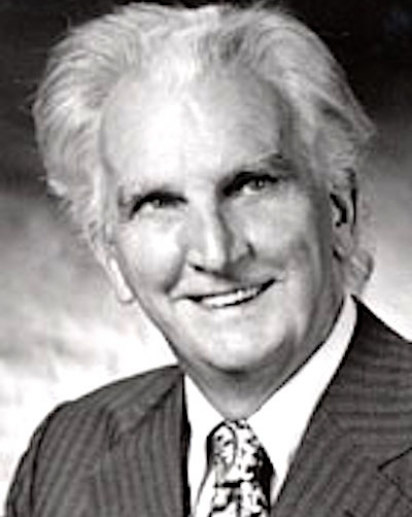
ENLARGE
|
The sincerity, the passion, the genuine pride in progress
and anguish over its failure to extinguish poverty, and the
attempt to fuse the intellectual rigor of classical economics
with ... a Christian morality, give Henry George a unique place
not only in the literature of economics but in the English
language itself.
[source not identified] |
Bourassa,
Steven C.

ENLARGE
|
My study of housing development in Pittsburgh
demonstrated that small decreases in the tax rate on buildings
resulted in substantial increases in the amount of new housing
constructed in the city. In contrast, increases in the tax rate on
land had no undesirable effects.
The evidence from Pittsburgh strongly supports the idea that
cities concerned with economic development should shift their real
estate taxes from buildings to land [in order to] maintain
revenues while encouraging development.
Given the results of this study, land value taxation seems to be
a desirable strategy for central cities to employ in seeking to
encourage development and attract households. Because households
are relatively mobile within metropolitan areas, land value
taxation may permit central cities to attract households that
would otherwise locate in nearly suburban jurisdictions.
[Professor of Economics, Memphis State
University; quoted from a 1987 study]
ABSTRACT,
Land Value Taxation and Housing Development, Effects of
the Property Tax Reform in Three Types of Cities, from the
American Journal of Economics and Sociology, January 1990,
Vol. 49, Issue 1.
|
Brandeis,
Louis D.
(1856-1941)
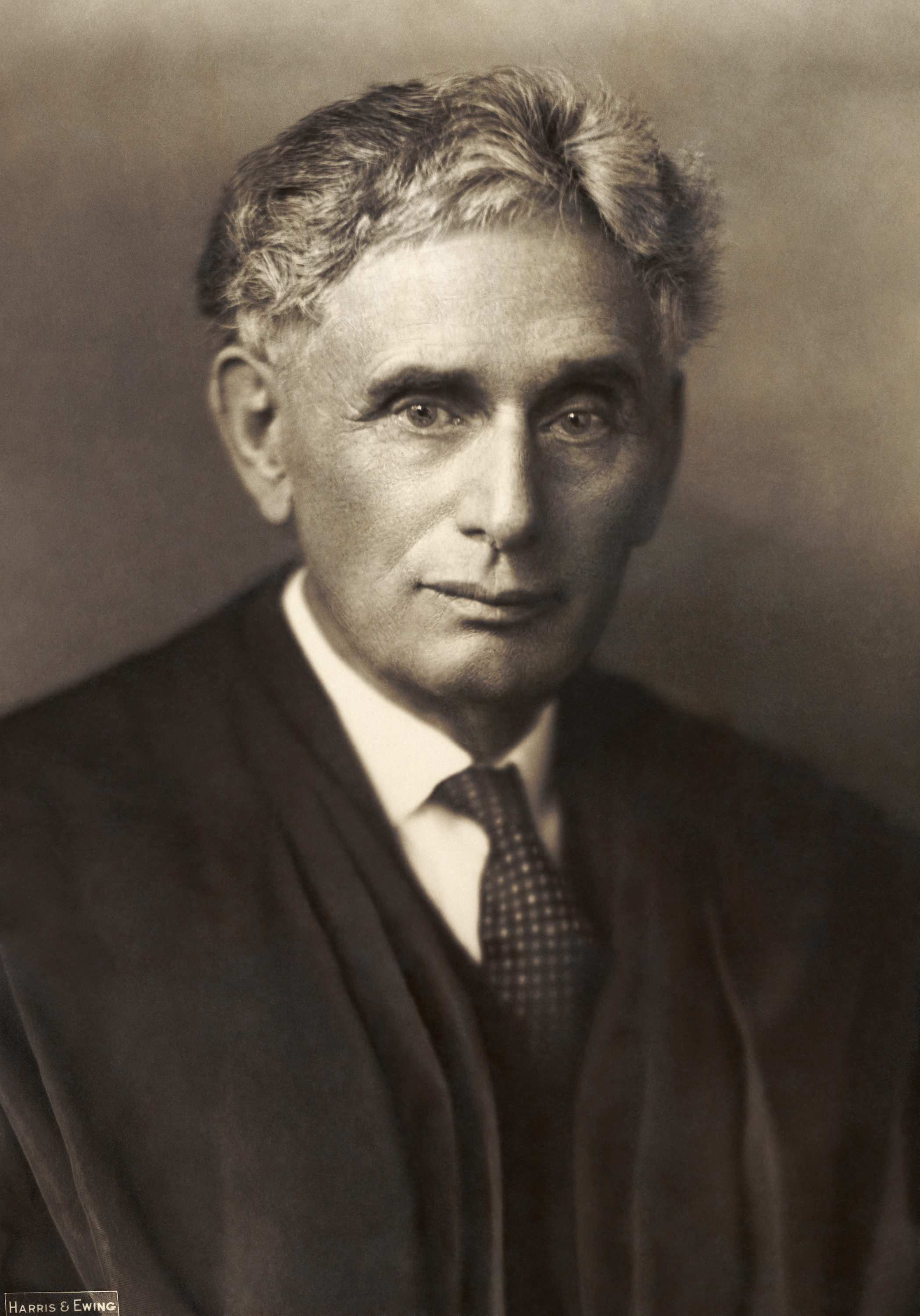
ENLARGE
|
I find it very difficult to
disagree with the principles of Henry George. ...I believe in the
taxation of land values only. |
Bright,
John

ENLARGE
|
I do not pretend to believe, if you examine the
terms strictly, in what is called the absolute property in land.
You may toss a sixpence into the sea if you like, but there are
things with respect to land which you cannot, and ought not, and
dare not do.
[From a Speech in the House of
Commons, 14 March, 1868, Speeches, Vol.I, pp. 397-8
(Edition of 1868)]
|
Bright,
John
|
This being the case, in what manner are the Irish
people to subsist in future? There is the land and there is labor
enough to bring it into cultivation. But such is the state in
which the land is placed, that capital cannot be employed upon it.
You have tied up the raw material in such a manner -- you have
created such a monopoly of land by your laws and by your mode of
dealing with it -- as to render it alike a curse to the people and
to the owners of it.
[From a Speech in the House of
Commons, 2 April, 1849, Speeches, Vol.I, pp. 332 (Edition
of 1868)]
|
Brooks,
Paul
|
We shall never understand the natural environment
until we see it as a living organism. Land can be healthy or sick,
fertile or barren, rich or poor, lovingly nurtured or bled white.
Our present attitudes and laws governing the ownership and use of
land represent an abuse of the concept of private property.
...Today you can murder land for private profit. You can leave the
corpse for all to see and nobody calls the cops.
[From: The Pursuit of Wilderness
(1971)]
|
Brueckner,
Jan K.

ENLARGE
|
... modern theory vindicates George's belief in
the efficiency of site value taxation.
[Associate Professor of Economics,
University of Illinois at Urbana-Champaign; a concluding remark at
the end of a paper on a mathematical analysis of the effects of
site value taxation]
|
Bryan,
William Jennings
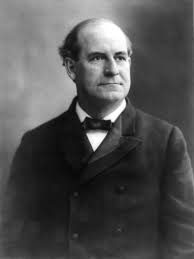
ENLARGE
|
Henry George was as guideless as a child, and as
earnest as a martyr.
Have you ever read Henry George’s “Progress and Poverty”?
If not I will send it to you. It ought to be read by every
thinking man & woman. I have not quite finished it but will by
the time you let me know if you have read it or not. You will
perhaps find it rather dry reading at first, but I think you will
get interested in it, and as I have done become a convert to his
theory.
[Boston, Sept, 9, 1887] |
Buchanan,
James

ENLARGE
|
The landowner who withdraws land from productive use to a
purely private use should be required to pay higher, not lower
taxes.
[Professor of economics and winner of
the 1986 Nobel Prize; from a lecture at St. Johns University, New
York City]
|
Buckle,
Henry Thomas
(1821-1862) |
The landlords are perhaps the only great body of men whose
interest is dramatically opposed to the interests of the nation.
[From: "Fragment on the Rise of
Agriculture," Miscellaneous Works(1885), Vol.I,
p.350]
|
Buckley,
William. F. (Jr.)

ENLARGE
|
Henry George said that the rent of all land ought to be
public. ...I am sympathetic with that particular analysis.
[From: Firing Line, PBS, 6 January,
1980]
|
Buckley,
William. F. (Jr.) |
William F. Buckley, Jr., on Henry George and the Single-Tax -
CSpan BookNotes interview with Brian Lamb (aired 4/2-3/2000)
"The Lexicon, A Cornucopia of Wonderful Words for the
Inquisitive Word Lover" by William F. Buckley, Jr. [Arnold
Roth, Illustrator, Jesse Sheidlower , Introduction.] Norwell,
Massachusetts. Go ahead, please.
CALLER: Mr. Buckley, it's a pleasure to talk to you. I've
heard you describe yourself as a Georgist, a follower of Henry
George, but I haven't heard much in having you promote land value
taxation and his theories, and I'm wondering why that is the case.
William F. Buckley: It's mostly because I'm beaten down by my
right-wing theorists and intellectual friends. They always find
something wrong with the Single-Tax idea. What I'm talking about
Mr. Lamb is Henry George who said there is infinite capacity to
increase capital and to increase labor, but none to increase land,
and since wealth is a function of how they play against each
other, land should be thought of as common property. The effect of
this would be that if you have a parking lot and the Empire State
Building next to it, the tax on the parking lot should be the same
as the tax on the Empire State Building, because you shouldn't
encourage land speculation. Anyway I've run into tons of
situations were I think the Single-Tax theory would be applicable.
We should remember also this about Henry George, he was sort of
co-opted by the socialists in the 20s and the 30s, but he was not
one at all. Alfred J. Nock's book on him makes that plain. Plus,
also, he believes in only that tax. He believes in zero income
tax. You look bored (addressing Brian Lamb)!
Brian Lamb: No, no. As a matter of fact I was going to ask
you about this little book ("Lexicon, A Cornucopia of
Wonderful Words for the Inquisitive Word Lover"). I'm
fascinated by it. I'm going to see if you can pronounce the word,
the-fear-of-having-peanut-butter-stuck-to-your-roof-of-your-mouth,
This little book starts off and the fellow's name, is it Jesse
Sheidlower?...
William F. Buckley: I think so.
Brian Lamb: S-H-E-I-D-L-O-W-E-R? You've never read it (the
Introduction to "The Lexicon").
William F. Buckley: No. I never have.
Brian Lamb: (Quoting the book) "The first time I met
William F. Buckley, we were both members of a televised panel
discussing word. The moderator introduced me with a pop-quiz to
test my credentials asked me to define the word..." Is it
USUFRUCT?
William F. Buckley: Usufruct, yeah.
Brian Lamb: (Quoting the book) "I felt smug as I recite
the right to enjoy another's property as long as you don't damage
it. Then Mr. Buckley leaned into his microphone and quoted an
entire paragraph on usufruct from the political economist, Henry
George.
William F. Buckley: Oh for heaven's sake!
Brian Lamb: And this little book has..
William F. Buckley: The land belongs to those in usufruct.
This passage is available to print out as a distinct page. Click
here.
|
Burgess,
Edwin
|
Edwin Burgess was a tailor living in Racine,
Wisconsin. In 1848 he wrote a letter which appeared in "Excursion
No. 45, Clearance No. 3, of the Portland [Maine] Pleasure boat, J.
Hacker, Owner, Master, and Crew," in which he said:
I want now to say a few words on the best means of raising
revenue or taxes so as to prevent land monopoly. I know not what
are your views on the subject, but should like to have you inquire
whether raising all the taxes off the land in proportion to its
market value would not produce the greatest good to mankind with
the least evil, of any means of raising revenue. Taxing personal
property has a tendency to limit its use by increasing its price,
and the consequent difficulty of obtaining it.
In 1859-60 Burgess gave a more extensive presentation of these
ideas in a series of eleven letters to the Racine Advocate,
in which he urged that land should be taxed and improvements
exempted. These letters aroused considerable discussion and some
opposition. Burgess believed that his policy would force idle land
into use, would encourage the production of wealth and increase
opportunities for employment, and would do away with the evasion
and fraud which accompany other taxes.
Were all the taxes on the land, and the people's land free,
then the hitherto landless could soon build their own homes on
their own land, and raise all they needed to consume or exchange,
and no longer need the land, house, or capital of others; then
rent, interest, and even usury would cease for want to poverty to
sustain them, for the curse, land monopoly, being removed, the
effect would case with the cause. Thus would the happiness of
mankind be immeasurably increased, and misery be proportionately
diminished; then would earth be redeemed from the giant sin of
land robbery, and the Paradise of the present or future be far
above that of the past.
[from: The Edwin Burgess Letters
on Taxation, p. 14.]
|
Burke,
Edmund

ENLARGE
|
Instead of putting themselves in this odious point
of light, one would think they would wish to let Time draw his
oblivious veil over the unpleasant modes by which lordships and
demesnes have been acquired in their and almost in all other
countries.
[From a letter to Richard Burke, Works,
Vol.VI, pp.75-6] |
Cable,
George Washington

ENLARGE
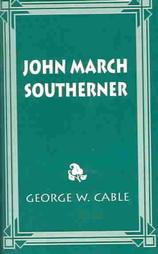
ENLARGE
|
He thought again of that deep store of the earth's largess
lying under the unfruitful custody, ... that root of so many
world-wide evils -- the calling still private what the commons
need has made public.
[From: John March, Southerner
(1895), Chap. XXVIII., p. 164]
|
Cairnes,
John Elliot

ENLARGE
|
Sustained by some of the greatest names -- I will say by every
name of the first rank in Political Economy, from Turgot and Adam
Smith to Mill -- I hold that the land of a country presents
conditions which separate it economically from the great mass of
the other objects of wealth, -- conditions which, if they do not
absolutely and under all circumstances impose upon the State the
obligation of controlling private enterprise in dealing with land,
at least explain why this control is in certain stages of social
progress indispensable.
[From: "Political Economy and
Land," published in Essays in Political Economy,
Theoretical and Applied, London 1873, p. 189. The essay here
quoted was first published in 1870, in the Edinburgh Rev.]
|
Cairnes,
John Elliot |
Little impression has been made on the rate of wages and
profits by the universal industrial progress of recent times.
...The large additions to the wealth of the country (England) has
gone neither to profits nor to wages, nor yet to the public at
large, but to swell a fund ever growing even while its proprietors
sleep -- the rent roll of the owners of the soil.
[From: Some Principles of
Political Economy]
|
Cairnes,
John Elliot |
Sustained by some of the greatest names -- I will
say by every name of the first rank in Political Economy from
Turgot and Adam Smith to Mill -- I hold that the land of a country
presents conditions which separate it economically form the great
mass of the other objects of wealth.. <
[From: Essays in Political Economy
(1870), Essay VI, p. 189]
|
Cairnes,
John Elliot |
A bale of cloth, a machine, a house, owes its
value to the labor expended upon it, and belongs to the person who
expends or employs the labor; a piece of land owes its value, so
far as its value is affected by the causes I am now considering,
not to the labor expended on it, but to that expended upon
something else -- to the labor expended in making a railroad or
building houses in an adjoining town. ...How many landlords have
their rent rolls doubled by railways made in their despite!
[From: Essays in Political Economy
(1870), Essay VI, p. 193]
|
Cameron,
Clyde

ENLARGE
|
I am certain that the ALP will once again produce
the kind of statesmen who in yesteryears had the intelligence and
the integrity to be right (and support the economic philosophy of
Henry George). ...That will one day make it possible for Christmas
to truly say, "Thy will be gone on earth as it is in heaven."
[Mr. Cameron served as the Federal
Minister for Labour in the 1972-1975 Whitlam government,
Australia] |
Campbell-Bannerman,
Henry
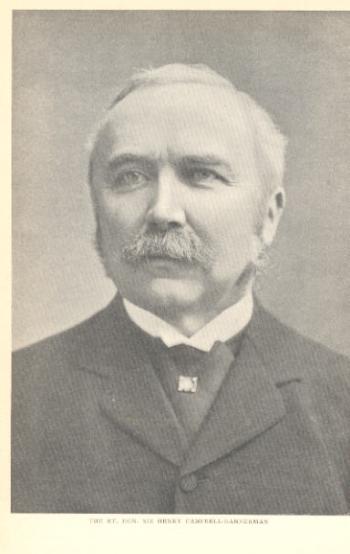
ENLARGE
|
"Let the value of the land be assessed independently of
the buildings upon it, and upon such valuation let contribution be
made to those public services which create the value. This is not
to disturb the balance of equity, but to redress it. …There
is no unfairness in it. The unfairness is in the present state of
things. Why should one man reap what another man sows? We would
give to the landowner all that is his, but we would prevent him
taking something which belongs to other people."
[Sir Henry Campbell-Bannerman, at
Leeds, 19th March 1903]
"Our present rating system operates as a hostile tariff
on our industries, it goes in restraint of trade, it falls with
severity on the shoulders of the poorer classes in the very worst
shape, in the shape of a tax upon house-room. …So long as
this system is left unamended, we are consenting - you and I, by
allowing it to remain unamended - to the aggravation of these
appalling evils of over-crowding, which are a disgrace to our
humanity and a blot upon our record as a capable self-governing
community."
[Sir Henry Campbell-Bannerman, at
Dunfermline, 22nd October 1907]
"We desire to develop our undeveloped estates in this
country - to colonise our own country - to give the farmer greater
freedom and greater security in the exercise of business - to
secure a home and a career for the labourer, is now in many cases
cut off from the soil. We wish to make the land less of a
pleasure-ground for the rich and more of treasure-house for the
nation."
[Sir Henry Campbell-Bannerman, at
the Albert Hall, 21st December 1905]
|
Cannan,
______ |
The movement for 'nationalizing' land without compensation to
present owners, on which Mr. Henry George and others have wasted
immense energy, would probably never have been heard of, if the
Ricardian economists had not represented rent as a sort of vampire
which continually engrosses a larger and larger share of the
produce, and if they had not failed to classify rent and interest
together as two species of one genus.
[From: Theories of Production and
Distribution, London (1903), p. 393]
|
Cantillon,
Richard |
It does not appear that Providence has given the right of the
possession of land to one man preferably to another: the most
ancient titles are founded on violence and conquest.
[From: Essay on the Nature of
Commerce (1755), Chapter 11]
|
Carlson,
Gary |
Specific changes in the state's property tax laws to allow
local governments to set separate higher tax rates on land and
lower tax rates on improvements could encurage economic
development.
[Community Development Director,
Newton, Iowa; from a research thesis abstract]
|
Carlyle,
Thomas

ENLARGE
|
Properly speaking, the land belongs to these two: the almighty
God and to all his children of men.
[From: Past and Present]
While the widow is gathering nettles for her children's dinner
a perfumed seigneur, delicately lounging in the Oeil de Beouf,
hath an alchemy whereby he will extract from her the third nettle,
and call it rent. <
[Source not identified]
"The Land is Mother of us all; nourishes, shelters,
gladdens, lovingly enriches us all; in how many ways, from our
first wakening to our last sleep on her blessed mother-bosom, does
she, as with blessed mother-arms, enfold us all! ... Properly
speaking, the Land belongs to these two: to the Almighty God; and
to all his Children of Men. …It is not the property of any
generation, we say, but that of all the past generations that have
worked on it, and of all the future ones that shall work on it."
[Thomas Carlyle, Past and Present, iii, 8]
"We hear it said, the soil of England, or of any country,
is properly worth nothing, 'except the labour bestowed on it,'
This, speaking even in the language of Eastcheap, is not correct.
The rudest space of country equal in extent to England - could a
whole English nation, with all their habitudes, arrangements,
skills, with whatsoever they do carry within the skins of them and
cannot be stript of, suddenly take wing and alight on it - would
be worth a very considerable thing! . . . On the other hand, fancy
what an English nation, once 'on the wing,' could have done with
itself, had there been simply no soil, not even an inarable one,
to alight on? Vain all its talents for ploughing, hammering, and
whatever else; there is no Earth-room for this nation with its
talents. …Soil, with or without ploughing, is the gift of
God. The soil of all countries belongs evermore, in a very
considerable degree, to the Almighty Maker! The last stroke of
labour bestowed on it is not the making of its value, but only the
increasing thereof."
[Thomas Carlyle, Past and Present, iii, 8]
|
Carlyle,
Thomas
|
Properly speaking, the land belongs to these two -- to the
Almighty God and to all the children of men that have ever worked
well on it, or that shall ever work well on it.
[From: Past and Present, Book
III, Chap.8]
|
Carnegie,
Andrew

ENLARGE
|
The most comfortable, but also the most unproductive, way for
a capitalist to increase his fortune is to put all his monies in
sites and await that point in time when a society, hungering for
land, has to pay his price.
[source unknown]
|
Carpenter,
Edward
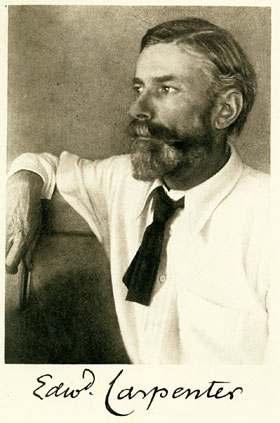
ENLARGE
|
Are they not mine, saith the Lord, the everlasting
hills? ...
Are they not mine, where I dwell -- and for my children?
How long, you, will you trail your slime over them, and your talk
of rights and of property?
[From: Towards Democracy
(1894), p. 340] |
Chamberlain,
Joseph

ENLARGE
|
"There is a trade at present in our midst which would
return to the wealth England £250,000,000 per annum, which
would give employment to I know not how many families of the
working classes. And that trade we might win, not by conciliating
barbarous potentates with slavery circulars, not by exporting
civilisation in chests of opium, nor by forcing it upon ignorant
people at the bayonet's point, but by freeing the land of England
from the trammels of a bygone age."
[From a speech delivered at
Birmingham, England in 1876]
|
Cheng,
Wen-Hui |
Raising the effective rates of the Land Value Tax not only
benefits local finance, but also improves the equity and
efficiency of the whole property taxation system.
[Professor of Public Finance, National
Chengchi University, Taiwan; from a paper written with Tzer-Ming
Chu, presented at the L.R.T.I. conference, November 1988]
|
Churchill,
Winston S.

ENLARGE
|
I have made speeches by the yard on the subject of land value
taxation, and you know what a supporter I am of that policy.
It is quite true that the land monopoly is not the only monopoly
which exists, but it is by far the greatest of monopolies -- it is
a perpetual monopoly, and it is the mother of all forms of
monopoly.
Nothing is more amusing than to watch the efforts of our
monopolist opponents to prove that other forms of property and
increment are exactly the same, and are similar in all respects to
the unearned increment in land.
|
Clark,
Colin

ENLARGE
|
What gives urban land its value, apart form the
few cents per square foot which the developer has to spend on
roads, wate rand sewerage connection, is its proximity to
opportunities for employment, shopping, education, etc. In other
words, the seller of urban land is mainly selling the fruits of
other people's labour. The requirements of social justice would
therefore indicate that heavy taxes should be imposed on land.
[Professor of Economics, November
1974] |
Clark,
Colin |
Land taxation reduces the price of land. This can
be shown by mathematical demonstrations and by practice.
[Quote from comments made by Prof.
Clark at a Colloquium on Land Values held in London during March,
1965]
|
Clark,
P.H. |
I have stressed the moral aspect of imposing a levey on site
values since I believe this to be fundamental to both site-value
rating and the recovery of betterment. Both principles rest on a
sound moral basis and on this ground alone, are valid.
[Quote from comments made by Prof.
Clark at a Colloquium on Land Values held in London during March,
1965]
|
Clemens,
Samuel
(1835-1910)

ENLARGE
|
Writing under the penname Mark Twain, Clemens authored the essay
Archimedes which on July 27, 1889 appeared In the San
Francisco newspaper, The Standard (edited by Henry
George). In this essay, Clemens joined Henry George by criticizing
private individual ownership of land without payment of the full
ground rent to society. Clemens became personally invovled in the
effort to publicize George's cause, actually helping to sell
tickets at Henry George lectures. In Archimedes, Clemens
writes:
The earth belongs to the people. I believe in the gospel of
the Single Tax.
|
Cobden,
Richard
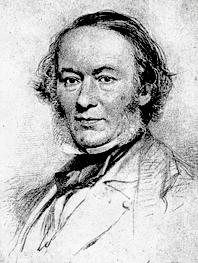
ENLARGE
|
For a period of one hundred fifty years after the [Norman]
Conquest, the whole of the revenue of the country was derived from
the land. During the next one hundred and fifty years it yielded
nineteen-twentieths of the revenue. For the next century down to
the reign of Richard III it was nine-tenths. During the next
seventy years to the time of Mary it fell to about three-fourths.
From this time to the end of the Commonwealth, land appeared to
have yielded one half of the revenue. Down to the reign of Anne it
was one-fourth. In the reign of George III it was one-sixth. For
the first thirty years of his reign the land yielded one-seventh
of the revenue. From 1793 to 1816 (during the period of the land
tax), land contributed one-ninth, from which time to the present
[1845] one-twenty-fifth only has been derived from the land.
...Thus, the land which anciently paid the whole of taxation paid
now only a fraction. ...The people had fared better under the
despotic monarchs than when the power of the state had fallen into
the hands of a landed oligarchy who had first exempted themselves
from taxation, and next claimed compensation for themselves by a
corn law for their heavy and peculiar burdens.
[From a speech delivered during the
Parliamentary debate on the Corn Laws, 1845]
|
Cobden,
Richard |
You who shall liberate the land will do more for your country
than we have done in the liberation of its trade.
[source not identified]
|
Coleridge,
Samuel Taylor

ENLARGE
|
Nothing but the most horrible perversion of humanity and moral
justice, under the specious name of political economy, could have
blinded men to this truth as to the possesion of land, -- the law
of God having connected indissolubly the cultivation of every rood
of earth with the maintenance and watchful labor of man. But
money, stock, riches by credit, transferable and convertible at
will, are under no such obligations, and, unhappily, it is from
the selfish, autocratic possession of such property, that our
landholders have learned their present theory of trading with that
which was never meant to be an object of commerce.
[From: Table Talk, March 31,
1833]
|
Coleridge,
Samuel Taylor |
These Islands are not very large. It is plainly conceivable
that estates might grow to fifteen million acres or more. ...These
things might be for the general advantage, ...but if not, does any
man possessing anything which he is pleased to call his mind, deny
that a state of law under which such mischiefs should exist, under
which the country itself would exist, not for its people but for a
mere handful of them, ought to be instantly and absolutely set
aside?
[From: "The Laws of Property,"
an address before the Glasgow Juridical Society, Macmillan's
Magazine, April, 1888, p. 406]
|
Coleridge,
Samuel Taylor |
I should myself deny that the mineral treasures
under the soil of a country belong to a handful of surface
proprietors in the sense in which these gentlemen appeared to
think they did.
[From: "The Laws of Property,"
an address before the Glasgow Juridical Society, Macmillan's
Magazine, April, 1888, p. 467]
|
Confucius
(B.C. 551-479)

ENLARGE
|
The great Chinese philosopher and teacher observed of his own
society's past and present:
When the Great Way prevailed, natural resources were fully
used for the benefit of all and not appropriated for selfish
ends... This was the Age of the Great Commonwealth of peace and
prosperity.
|
Cranston,
Alan

ENLARGE
|
A potentially important application of the societal collection of
rent takes the form of the eventual removal of taxes from location
improvements, so that only the rental value of the location itself
-- but all of that value -- is collected for societal use.
Cranston, a long-time member of the U.S. Senate, expressed support
for this gradual reform in the Los Angeles Times (Nov. 20, 1967):
Higher taxes on land and lower taxes on improvements have
already been tested successfully.
|
Currie,
Lauchlin
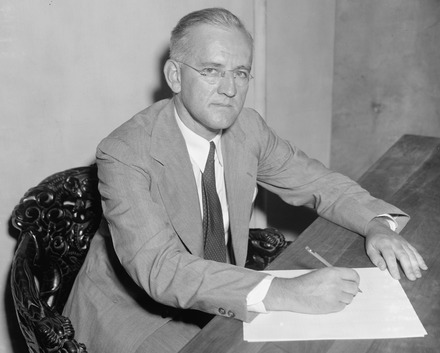
ENLARGE
|
Lauchlin Currie was an early advocate of treating housing as a "leading
sector" in the advance of under-developed economies. In a
paper he prepared for Habitat, the UN Conference on Human
Settlements, in 1976, he wrote:
It is a striking example of our economic illiteracy that we
have more or less quietly acquiesced in the private appropriation
of socially created gains, letting fortunate owners and their
heirs levy tribute or claim a share of the national income to
which they have contributed nothing. [The case for capturing] all
or a large portion of the pure monopoly gain of rising urban land
has been impaired by failure to distinguish between land and
capital in general, between land and building, and between the
rise reflecting inflation and that traceable to pure scarcity.
The rise in land values ... that results from the growth in
numbers and income of a community is a reflection of pure
scarcity. It arises from the community and should belong to the
community. It does not in any way arise form the work or saving of
an individual owner and does not provide any incentive to work or
save, since the supply of land is fixed.
[See: Lauchlin Currie, "Controlling
land use: the key to urbanization," Ekistics, 244,
March 1976, pp.137-143. ]
|
|













































